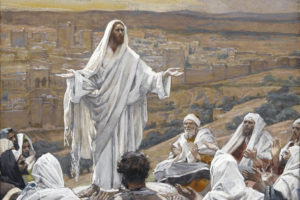Bible Passage
21 And [Jesus] said to them, “Is a lamp brought in to be put under a basket, or under a bed, and not on a stand? 22 For nothing is hidden except to be made manifest; nor is anything secret except to come to light. 23 If anyone has ears to hear, let him hear.” 24 And he said to them, “Pay attention to what you hear: with the measure you use, it will be measured to you, and still more will be added to you. 25 For to the one who has, more will be given, and from the one who has not, even what he has will be taken away.” (Mark 4:21–25, ESVUK)
Context
The key to understanding this passage is by looking at the context. Just before, the Lord Jesus had told his audience many parables (Mk 4:2), and Mark specifically records his telling of the Parable of the Sower (Mk 4:3–9). In it, Jesus likens the Word of God to seeds that a sower scatters on different types of soil, which represent people, and explains the different ways people react to the Word (Mk 4:13–20). After telling the parable, Jesus was alone, and his disciples, and others with him, privately asked him about the parables (Mk 4:10). Jesus replied:
11 To you has been given the secret of the kingdom of God, but for those outside everything is in parables, 12 so that “they may indeed see but not perceive, and may indeed hear but not understand, lest they should turn and be forgiven.” (Mark 4:11–12)
Here, we see two important theological truths. First, Jesus teaches that by ourselves, we cannot understand divine revelation unless God himself gives us insight.[1] As other Bible passages teach, faith in Jesus is a gift from God the Father, through the Holy Spirit (1Cor 12:3; Eph 2:8–9). Second, this “inner circle” of followers gained insight into Jesus’ teachings because they chose to inquire further, and sought to learn what Jesus meant, unlike the others, who could have asked, but instead chose not to understand Jesus’ parables. This parallels Jesus’ teaching, “Ask, and it will be given to you; seek, and you will find; knock, and it will be opened to you” (Mat 7:7). This is confirmed by Mark later, when he said, “but privately to his own disciples he explained everything” (Mk 4:34).
Nothing Is Secret Except to Come to Light
After explaining the Parable of the Sower, Jesus then says, “Is a lamp brought in to be put under a basket, or under a bed, and not on a stand? For nothing is hidden except to be made manifest; nor is anything secret except to come to light” (Mk 4:21–22). Just as a lamp is supposed to shine in the darkness without being covered, the purpose of Jesus’ parables is not to hide truth, but impart it.[2],[3] Jesus’ parables do so in a way that “filters” the listeners, so to speak, as when filtering liquid through a fine cloth to purify it; the disciples had to take in the truth from the parables before being able to take in more truth from Jesus later, but in order to do so they had to be willing to learn.[4]
When we look at Mark 4:21 retrospectively, from the lens of Jesus’ once-for-all sacrifice for sins on the cross and resurrection (Heb 9:27–28; 10:10, 12–14; Ac 3:14–15), the lamp could also be referring to the Gospel—the message which tells us how we can be part of God’s kingdom (that is, by accepting Jesus as our crucified and risen Saviour) (Rom 1:16).[5],[6] In this way, Jesus is encouraging Christians to proclaim the Gospel of Christ’s marvellous light (1Pt 2:9) to the world which has been darkened by sin, rather than keep it to themselves. Because a lamp can be a metaphor for the Messiah (2Ki 8:19; Ps 132:17), it could also refer to Jesus himself, the True Light of the world (Jn 1:9–10; 8:12), who came to make known and fulfil God’s plan of salvation (Jn 3:14–16; 12:44–50).[7]
Mark 4:22 primarily means that although Jesus’ ministry and teachings on the kingdom of God (God’s reign in Christ and his people, the Church) is presently hidden in parables, it will one day be manifested to the world.[8],[9] This happened partially after Jesus rose again from the dead. This was when he gave his disciples a full understanding of his true identity (Lk 24:25–27), imparted upon them the Holy Spirit to teach them all things (Jn 14:16–17, 26; 20:22), and commissioned them to proclaim the Gospel, and thus build God’s kingdom, to the ends of the Earth (Mk 16:15; Ac 1:8). In this way, the Church acts as the agent through which Jesus brings the secrets of the kingdom to light in the world. This will be completed when Jesus comes again to the Earth in glory to judge the living and the dead (Mat 16:27; 2Tim 4:1), at which point every knee will bow before him “in heaven and on earth and under the earth, and every tongue confess that Jesus Christ is Lord, to the glory of God the Father” (Php 2:10–11).
Mark 4:22 has additional eschatological implications. We will all (both Christians and non-Christians), either straight after death or when Jesus comes again, stand before Jesus Christ at his throne of judgement to personally give account for our lives—for the good we’ve done and the evil (Heb 9:27; 2Cor 5:10). There, we cannot hide anything from our Lord—for “no creature is hidden from his sight, but all are naked and exposed to the eyes of him to whom we must give account” (Heb 4:13). Not only will every good deed that went unnoticed be revealed before us and Jesus, but also every evil deed that we kept hidden, for Jesus did say “nothing is hidden … nor is anything secret except to come to light” (Mk 4:22). This is supported by Jesus’ parallel teaching in Luke 12:1–3, in which Jesus connects this saying with the need to be on guard against hypocrisy, adding, “Therefore whatever you have said in the dark shall be heard in the light, and what you have whispered in private rooms shall be proclaimed on the housetops” (Lk 12:3).
Of course, as Christians we affirm that Jesus paid our sin punishment fully on the cross (Col 2:13–14; 1Pt 2:24; 3:18), that he has forgiven us (1Jn 1:8–10), and that if we hold fast to him in faith, there is no condemnation for us (Rom 8:1). Nevertheless, we will still face the temporary consequences for our sins. If we don’t clean up our act now, and fail to repent of some sins before we die, then we will face the shame and humiliation of our misdeeds being made public in Jesus’ presence. As punishment, our Lord may deprive us of the rewards we could have received in Heaven (1Cor 3:13–15). There is also the chance that we harden our hearts so much to the point where we fall away from the faith, and thus lose the gift of eternal life (Heb 3:12–13).
Jesus’ statement that follows this, “If anyone has ears to hear, let him hear” (Mk 10:23), acts as an invitation to faith. Jesus does not force, coerce, or scare his hearers into becoming Christians; instead, he gently extends the invitation for them to do so, through the power of telling parables. This is highly effective, because parables invite us to place ourselves into the story. In using parables, Jesus goes beyond appealing to our intellect, and prompts a response from our hearts. Jesus knows that not all people have faith or will be interested in believing (Jn 2:23–24), so he calls those who are interested to follow him now. This statement also shows the importance that Jesus places on listening to him carefully—for he has the words of eternal life (Jn 6:68). There is salvation in no one else (Ac 4:12).
With the Measure You Use, It Will Be Measured to You
Then, Jesus says, “Pay attention to what you hear: with the measure you use, it will be measured to you, and still more will be added to you. For to the one who has, more will be given, and from the one who has not, even what he has will be taken away” (Mk 4:24–25). Notice how Jesus said, “Pay attention to what you hear”; Jesus’ emphasis here is on the need for us to listen carefully to him. We must not only hear, but hear properly, and seek to understand the underlying message of the parables.[10],[11] We must be willing to humble ourselves and take the position of students, seeking to learn from Christ, our Teacher (Mat 11:29; 23:12; Jn 13:13–14).
In this context, “with the measure you use, it will be measured to you” (Mk 4:24) means that the effort we put into listening to and learning from Jesus’ parables will correlate with the spiritual benefits that we receive from them. If we listen and respond with an open heart, like those in the inner circle (Mk 4:11), we will grow in understanding and receive spiritual blessings and God’s kingdom in an even greater measure; but if we do not, we will lose the kingdom altogether (Mk 4:25).[12],[13],[14]
Mark 4:25 corresponds to the fact that we entered the world with nothing, and cannot take anything with us after we die except for the faith that is within us (1Tim 6:7). If our faith is in Christ before death, we will take with us all the spiritual benefits that come with it into the heavenly abode that he has prepared for us (Jn 14:1–3), which he bought for us at the insurmountable cost of his life (Mk 10:45). If our faith is not in Christ, then we will lose absolutely everything in this life, including our own souls to the everlasting fires of Hell (Mk 9:43–48; Lk 12:15–21).
Jesus’ saying in Mark 4:24 parallels what he said in Matthew 7:1–2, but in the latter, Jesus connects it with judging others, saying, “Judge not, that you be not judged. For with the judgement you pronounce you will be judged, and with the measure you use it will be measured to you” (Mat 7:1–2; see also Lk 6:38). In this case, Jesus’ words here can also refer to the fact that how we treat others will ultimately correspond with how God treats us when we meet him face to face. If, in faith, we treat others the way we would want to be treated (Mat 7:12), God will graciously repay us with even more kindness and goodness than we gave (Mat 6:3–6, 10:40–42; Lk 6:35; 1Cor 3:13–15).
But if we harden our hearts and repeatedly treat others cruelly or shamefully without repenting—at which point it can be said that faith no longer exists in such a person (e.g., Gal 5:19–21; 1Tim 5:8; Heb 3:12; 1Jn 3:15)—God will repay us with a punishment that corresponds to our misdeeds in Hell (Ps 37:12–13; 145:20; Pr 13:9; 15:3; Mat 24:45–51). The theme of our end corresponding to our deeds is prominent throughout Scripture, as seen in the below passages.
- “For judgement is without mercy to one who has shown no mercy. Mercy triumphs over judgement.” (James 2:13)
- “For if you forgive others their trespasses, your heavenly Father will also forgive you, but if you do not forgive others their trespasses, neither will your Father forgive your trespasses.” (Matthew 6:14–15)
- “Judge not, and you will not be judged; condemn not, and you will not be condemned; forgive, and you will be forgiven; give, and it will be given to you.” (Luke 6:37–38a)
Conclusion
There was a lot to take in from this small Bible passage. Here are three main points to take home. 1. When Jesus returns, the secrets of the kingdom will be revealed to the whole world and it will be evident to everyone that he is truly the King of Heaven and the universe (Mk 4:21–22; Rev 17:14; 19:16). Nevertheless, it will be too late for unbelievers to repent on that day (Mat 22:11–14). In the meantime, Christians are instructed to “put the lamp on the stand” by proclaiming the good news of the kingdom to others (Mat 28:19–20; Mk 4:21; 16:15).
2. If we put in the effort of listening to Jesus’ teachings, pondering them, and applying them to our lives, God will grant us spiritual blessings in even greater measure (Mk 4:23–25; Mat 7:7). Ignoring Jesus or not taking him seriously will just lead to confusion and ignorance, and potentially apostasy (Mk 4:12; Jn 6:60, 66; Heb 3:12). 3. There is no such thing as “secret sins”, because all our actions will be made public before Jesus on the last day (Mk 4:22; Lk 12:1–3). So, let’s not become prideful, but instead humble ourselves before God (Is 66:2). If we live each day by trusting in Jesus, living under his easy yoke (Mat 11:29–30), and repenting of our sins, we will have nothing to fear when we die. In Christ there is no condemnation (Rom 8:1).
To learn how to have your sins forgiven, and spend eternity with Jesus Christ, please read the following article.
See Also
- What Is the Kingdom of God?
- Where Do Our Souls Go When We Die and After Judgement Day?
- Why Did Jesus Come into the World?
- What Does the Holy Spirit Do?
Notes
[1] Edward A. Engelbrecht et al., The Lutheran Study Bible (St. Louis, MO: Concordia Publishing House, 2009), 1662.
[2] Stephen S. Short, ‘Mark,’ in Zondervan Bible Commentary: One-Volume Illustrated Edition, ed. F. F. Bruce (Grand Rapids, MI: Zondervan, 2008), 1111.
[3] Alan Cole, ‘Mark,’ in The New Bible Commentary, 4th ed., ed. D. A. Carson, R. T. France, and G. J. Wenham (Nottingham, England: Inter-Varsity Press, 2015), 958.
[4] Cole, ‘Mark,’ 958.
[5] Engelbrecht et al., The Lutheran Study Bible, 1663.
[6] Lou Barbieri, ‘Mark,’ in The Moody Bible Commentary, ed. Michael Rydelnik and Michael Vanlaningham (Chicago, IL: Moody Publishers, 2014), 1526.
[7] James R. Edwards, ‘Mark,’ in The Baker Illustrated Bible Commentary, ed. Gary M. Burge and Andrew E. Hill (Grand Rapids, MI: BakerBooks, 2012), 1019.
[8] Scott Hahn and Curtis Mitch, The Ignatius Catholic Study Bible: The New Testament, Revised Standard Version Second Catholic Edition (San Francisco: Ignatius Press, 2010), 73.
[9] Edward E. Hindson et al., Zondervan King James Version Commentary: New Testament (Grand Rapids, MI: Zondervan, 2010), 103.
[10] Jack Norman Sparks et al., The Orthodox Study Bible (Elk Grove, California: St. Athanasius Academy of Orthodox Theology, 2008), 1335.
[11] Short, ‘Mark,’ 1111.
[12] Sparks et al., The Orthodox Study Bible, 1335.
[13] Short, ‘Mark,’ 1111.
[14] Edwards, ‘Mark,’ 1019.
Bibliography
Barbieri. 2014. ‘Mark.’ In The Moody Bible Commentary. Edited by Michael Rydelnik and Michael Vanlaningham. Chicago, IL: Moody Publishers, 2014.
Cole, Alan. 1994. ‘Mark.’ In The New Bible Commentary. 4th ed., edited by D. A. Carson, R. T. France, and G. J. Wenham. Nottingham, England: Inter-Varsity Press, 1994.
Edwards, James R. 2012. ‘Mark.’ In The Baker Illustrated Bible Commentary. Edited by Gary M. Burge and Andrew E. Hill. Grand Rapids, MI: BakerBooks, 2012.
Engelbrecht, Edward A., Paul E. Deterding, Roland Cap Ehlke, Jerald C. Joersz, Mark W. Love, Steven P. Mueller, Scott R. Murray, Daniel E. Paavola, Victor H. Prange, Robert A. Sorensen, and Michael P. Walther. The Lutheran Study Bible. St. Louis, MO: Concordia Publishing House, 2009.
Hahn, Scott and Curtis Mitch. The Ignatius Catholic Study Bible: The New Testament, Revised Standard Version Second Catholic Edition. San Francisco: Ignatius Press, 2010.
Hindson, Edward E., Daniel R. Mitchell, Barth Campbell, Mal Couch, Steven Ger, Harvey Hartman, Ronald Hawkins, Fred Smith, Jon Venema, Gary Yates. Zondervan King James Version Commentary: New Testament Grand Rapids, MI: Zondervan, 2010.
Short, Stephen S. 2008. ‘Mark.’ In Zondervan Bible Commentary: One-Volume Illustrated Edition. Edited by F. F. Bruce. Grand Rapids, MI: Zondervan, 2008.
Sparks, Jack Norman, J. Richard Ballew, Metropolitan MAXIMOS, Eugen Pentiuc, Michel Najim, Peter E. Gillquist, Alan Wallerstedt, Joseph Allen, Theodore Stylianopoulos. The Orthodox Study Bible. Elk Grove, California: St. Athanasius Academy of Orthodox Theology, 2008.






